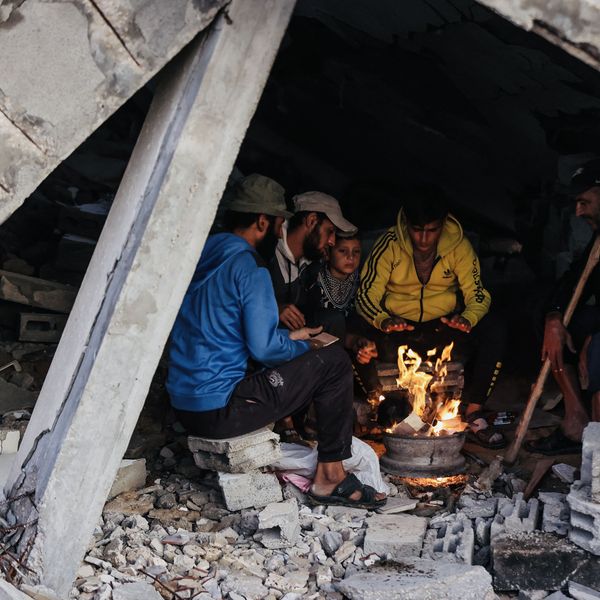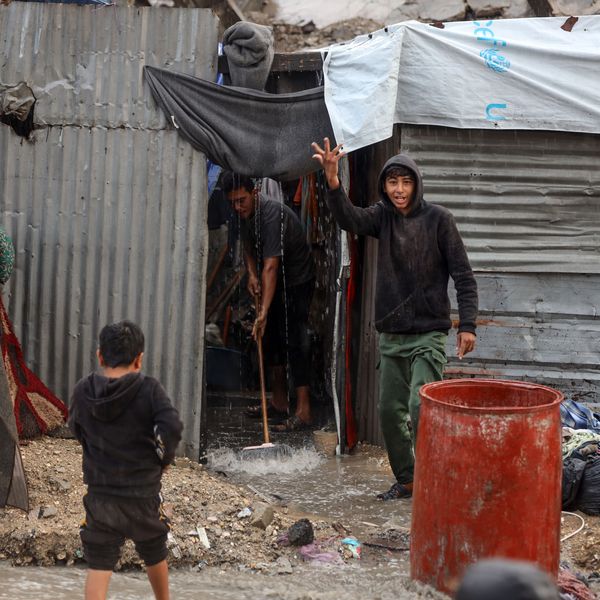IN THE CROWDED, squalid Deheisha refugee camp near Bethlehem on the occupied West Bank, more than 11,000 Palestinians live in about one-half a square kilometer. Hundreds of Deheisha's children flock each day to the Ibda'a Cultural Center, where they exchange e-mail with children in other refugee camps, study art and music and play computer games, join a world-renowned dance troupe, and find intensive tutoring for their high school comprehensive exams. Ibda'a means "something from nothing" in Arabic. The children also learn their history, including how their grandparents lost their homes in what is now Israel more than 50 years ago.
About two weeks ago, arsonists struck Ibda'a, destroying the computer center and the children's library. No one knows who is responsible. But Ibda'a's role in the new political mobilization among Palestinian refugees for their right of return was likely a big part of the attackers' motivation.
No one ever said that resolving the fate of Palestinian refugees would be easy. Israel comes to the negotiations with a strong hand: It holds the land of the 500 or so villages that were demolished during and after the 1948 war, and from which hundreds of thousands of Palestinians were expelled. Palestinian representatives, on the other hand, come to the table backed only by their 5 million exiles, most of them stateless refugees.
The United Nations welcomed Israel as its newest member with Resolution 273, passed on May 11, 1949. The membership resolution stated specifically that entry to the world body was based on Israel's statements regarding its ability and willingness to implement the earlier Resolution 194 of December 1948, and the rights it granted to the Palestinians. Those were the right to return home and compensation for their losses during the war.
Palestinians today make up one of every four refugees in the world. Their right to return to their homes, despite more than a 52-year delay in realizing that right, is no less compelling than the right to return home of any other refugees from any other war. International law is very clear: It doesn't matter which side wins or which side loses, after a war, refugees have the right to go home. The United Nations passed Resolution 194 (which the U.S. and every other U.N. member state except Israel voted to reaffirm each year from 1949 till 1994) specifically to make sure that those made refugees by the creation of Israel would be protected. And yet Israel specifically rejects that right of return because of concern that allowing the Palestinian refugees to come home would change the demographic balance of the Jewish state.
After the 1948 war, what Israelis call "the War of Independence" and Palestinians call al-nakba, or "the Catastrophe," the families who lost their homes clung tightly to their memories. Many held on to their house keys in the expectation of a quick return.
Their children grew up on an idealized vision of Palestine as a paradise where every family was rich, everything was beautiful, everyone was happy. That second refugee generation created the intifada, or uprising, 40 years later, aimed at achieving an independent Palestinian state in the occupied West Bank, Gaza and East Jerusalem. The unlikely possibility of actually returning to their parents' romantic vision of a Palestine now lost inside the 1967 borders of Israel was not at the top of their agenda.
But now a third generation is growing up in the fetid refugee camps of the still-occupied West Bank, Gaza, and surrounding Arab countries. And this new generation is growing up shaped by the failures of the Oslo peace process. These young refugees, now in their teens and early twenties, are bringing renewed passion but at the same time a new realism to claim their right of return.
In a July visit, teen-agers from the Ibda'a Center traveled to the villages their families had left behind in 1947 or 1948. The villages -Zakariyah, Beit Jamal, Jerash, Deir Hawa - were demolished by Israeli forces during and after the war. Most of the villages were completely destroyed, with fast-growing pine trees planted over the foundations, and only the straight rows of cactus that once marked property lines still visible. A few damaged walls and minarets were left standing. Mostly, only the ancient olive trees remain.
As part of an extraordinary oral history project, the Deheisha children have interviewed their grandparents who were expelled in 1948 and have studied the culture, architecture, and history of the villages, and where their residents ended up. Now, traveling to the remains of the villages, the children explain to visitors where the school was, where the mosque stood, how the residents made their living, where their own grandparents' houses were located.
This third generation of Palestinian refugees is preparing for a real, not romantic or idealized, return. They discuss what kind of houses they will build, how they will get water, where the electricity will come from. Two young girls, surveying the land from a precarious perch atop a ruined minaret, debate whether and how they can live with the Israeli families who have built new houses on and around some of their land.
Is compromise possible? Absolutely. But only if it is based on recognition of the right of return as a real, fundamental right - not if it is based on Israel's superior power. Israel's proposal during the recent Camp David summit for a "humanitarian" family reunification program that would benefit only a few tens of thousands, out of the millions of stateless Palestinians, is one compromise that will surely not work.
Another sure-to-fail compromise is the proposal being quietly bandied about in Washington and a variety of Middle Eastern capitals. This plan envisions a quid pro quo in which Baghdad would resettle many of the Palestinians (with or without their consent) from refugee camps in Lebanon to Kurdish areas of Iraq (from which equally unconsenting Kurds are already being expelled), in exchange for lifting the crippling economic sanctions against Iraq.
Publicly denied by the relevant governments, the plan has in fact been discussed with Iraqi officials by the representative of at least one member of the U.S. Congress, and a number of Arab leaders are known to privately support the idea. This is a non-starter too.
Real compromise is possible in determining how, not whether, the right of return will be realized. The Palestinians' return could be implemented in ways that minimize, rather than exacerbate, the disruption for Israelis living in the areas. Refugees might agree to return to their lands and villages but leave negotiable exactly which properties will be reclaimed. Certainly not all Palestinian refugees will ultimately opt to return. But the right to return is absolute, and cannot be compromised away.
The question of who makes the decisions is fundamental. Palestinian refugees must be allowed to accept or reject their own compromises. Refugee camp residents must be fully represented among the official Palestinian negotiators. The starting point of any agreement must be Israel's acknowledgment of the binding legal commitment it made to the United Nations 51 years ago to implement Resolution 194 and to recognize the absolute right of Palestinian return.
In the destroyed village of Zakhariyah, as the Ibda'a children picked lemons from the trees scattered across what was once their families' land, one of the adult coordinators who was born in the Deheisha camp said quietly, almost to himself, "I can close my eyes and see it, see the people coming to the mosque, to the market. They cannot play with this history."


